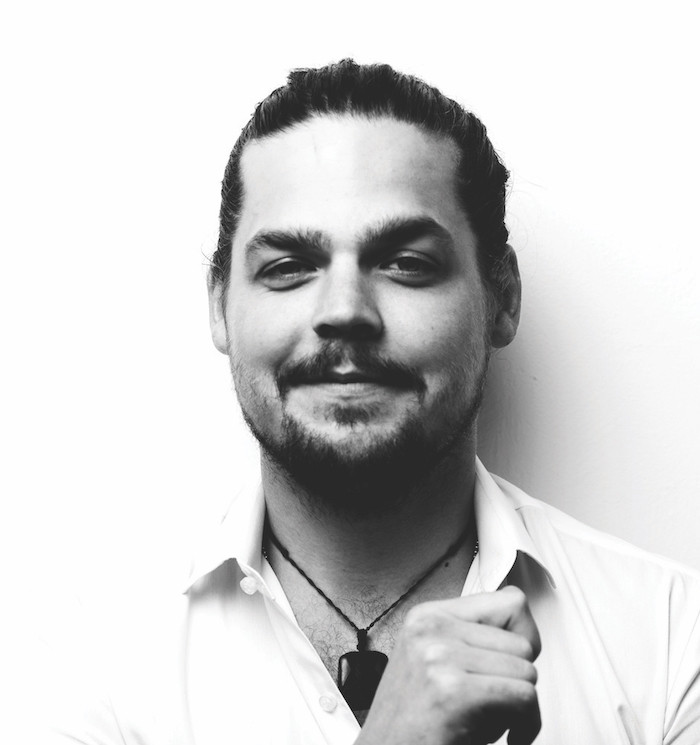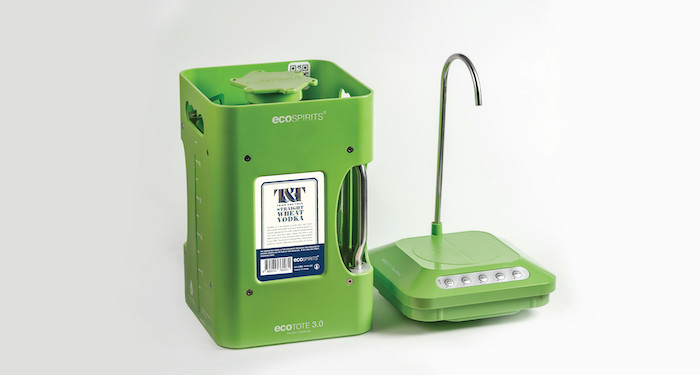
A spirits distribution system that lowers waste and carbon emissions has been launched in the UK. Zdenek Kastanek speaks to Hamish Smith about Ecospirits and its war on single-use packaging.
Bottles made of glass, transported in cardboard boxes – for as long as anyone can remember, this has been the way bars are supplied spirits. We mostly don’t question it – compared to plastic, glass is a recyclable, clean material, right? Well, it’s not that simple when you consider the energy required to recycle glass, the cost of transporting it and all the protective packaging it needs. Ecospirits – already established in 25 cities across Asia Pacific and working with almost 800 bars, restaurants and hotels globally – is rolling out in Europe this autumn and winter. Its aim is not modest – to revolutionise spirits logistics by providing a carbon-cutting alternative. Having worked with Deloitte on a carbon emissions calculator, it aims to prove it too.
Tell us about the impact of glass bottles
People believe glass is easily recyclable but it needs to be heated to 1,200-1,300° to be remoulded and that requires a lot of energy. If there is any contamination you can’t recycle it fully. You also need a lot of water to remove the glue and labels. And glass is heavy. If you combine all that and the packaging around it – the cardboard box, dividers, labels, metal cap etc – it’s a lot of packaging thrown away. Anything single use is a bad thing. We need to move to circular; to reusing things. Global consumption in 2020 was over 40 billion spirits bottles and 22 million tonnes of emissions. There are 550g of carbon emissions per bottle. Our mission is to end single-use glass in the spirits industry by leading a transition to circular packaging technology.
How does Ecospirits help?
We use Ecototes. Instead of a protective cardboard outer layer for a case of alcohol, the Ecotote is made from a singular polymer plastic as the protective layer, which can be dropped from 5-6ft and doesn’t break, so it’s better for waste. Instead of six individual bottles (4.2l if 70cl bottles or 4.5l if 75cl), Ecotote has one glass cylinder which delivers 4.5l. One Ecotote eliminates more than 1,000 single-use glass bottles over its lifespan.
The beating heart of the system is Ecoplant – a 20ft retro-fitted container. There is one of these stations in London and we have a fleet of 2,000 Ecototes to support the UK launch. For example, Avallen calvados is shipped as a bulk liquid from Normandy to the Ecoplant where the Ecototes are filled. Each Ecoplant supports a 500km radius, so in the UK we will eventually place another Ecoplant in Edinburgh to support Scotland. You can fit 550-600 bottles on a pallet, but by shipping in bulk, you can fit the equivalent of 1,000 bottles in the same space.
How does the system work in venues?
We wanted to develop something that doesn’t change the experience. You still see the bartender flipping the bottle, pouring it into a mixing glass, etc. It stays the same. But the bottle is refilled – mostly back of house – from the Smartpour [which is connected to the Ecotote]. So the brand doesn’t lose its number one POS marketing tool – the bottle. We’ve found the bottle needs to be changed every four-six weeks. So when a bar is placing an order, it says – for example – we need two Ecototes of X brand, two to be picked up, and we need two original bottles because the labels are worn off. Instead of getting through 300 bottles a month, it’s two.

What’s the impact on cost?
It’s economical for all of parties. Smaller brands can lower their price points. We can ship more in the same space, there is a reduction in glass, labels, cardboard costs, so there is less cost associated for everyone, including the venue, which will be getting the same liquid but cheaper.
Which brands are signed up in the UK?
It’s designed for liquids that move – cocktail spirits and house pours. The brand needs to be of a certain size in accounts to use the system. In the UK we have Tried & True vodka, Widges gin, Arquitecto tequila, MacKintosh scotch, Avallen calvados, Portobelllo Road gin, Arbikie Nàdar vodka and gin, Davna vodka. By summer next year you will see many more brands. In Asia Pacific our system has become well known but we are at the beginning of the journey. It’s an open platform for all brands but we need the majors to achieve our mission of ending single-use glass and a number have reached out. That’s exciting.
Are you further offsetting?
The Ecospirits Forest programme – managed by our CO2 specialist partners at Green Steps Group – sees a tree planted for every Ecotote that goes through the full loop. That’s an additional 120g of carbon emissions savings per spirits serve. The brand partner, channel partner and Ecospirits Global each chips in a third of the cost of planting each. Because Green Steps geo-tags each tree, the QR code on the cocktail bar menu allows you to see the tree, the forester that planted it, what species it is, who owns the impact of the carbon reduction – the bar – and which brand sponsored it.


